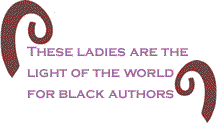A
community icon passed away last week. Dr. Dolores Nehemiah
was a very celebrated person in the Los Angeles black community. She wasn�t a preacher,
or a politician, or an athlete, or an entertainer, people
we commonly associate with �everybody knows my name� celebrity.
But those who know L.A.,
knew Dolores Nehemiah, particularly, if you loved
to read, or loved (or wrote) books. When you saw her and
her group of ladies (with big hats) coming, you stopped
and paid deference to who they are and what they represent.

They
were the Our
Authors Study Club, a literacy group founded in
1945 for the purpose of promoting those blacks authors who
were driving a reading renaissance throughout the United
States. It became known as the Chicago
Renaissance, which followed the Harlem Renaissance, but
unlike the Harlem Renaissance, the Chicago Renaissance focused
on the race realities of America.
The
Our Authors Study Club encourages its members to
read black authors and learn the history as told by African
and African American scholars, to refute the incomplete
history that was being chronicled about African Americans,
to know the new discoveries about the true role of blacks
in American history and to understand why black scholarship
was important in not just revising the history - but in
correcting the history. Revisionist history is often frowned
upon because its how historical facts get twisted. But books
stay around for hundreds, even thousands, of years, and
without correction, they represent the documented time,
word and perspective of the time. Our Author Study Club,
supporting the mantra that history is to be studied
and not just read, would later become affiliated with the
Association
for the Study of African American Life and History (ASALH),
and would become its Los
Angeles chapter. Dolores Nehemiah was its President for
nearly 20 years.
 Every
author in Los Angeles knew there was no greater advocate for
reading than Dr. Nehemiah. Whenever she met you, she asked
you, �What�s the last book you read?� Or, �What you working
on? I know you�re writing!� If she was impressed with your
response, she�d say, �Oh, that�s good.� If she wasn�t, she�d
say, �Well, you know, we are what we read. But don�t stop
reading!� That was her way of saying, �Go deeper. Study
more. Discover yourself through literacy.� Every
author in Los Angeles knew there was no greater advocate for
reading than Dr. Nehemiah. Whenever she met you, she asked
you, �What�s the last book you read?� Or, �What you working
on? I know you�re writing!� If she was impressed with your
response, she�d say, �Oh, that�s good.� If she wasn�t, she�d
say, �Well, you know, we are what we read. But don�t stop
reading!� That was her way of saying, �Go deeper. Study
more. Discover yourself through literacy.�
Even
with the rise of �Street Lit� (erotic literature), she preferred
to focus on the positive aspect of getting those who would
not otherwise pick up a book to read something. I remember
having a conversation with her about it. While she didn�t
agree with the lack of substance the genre represented,
she maintained her position that reading was the ultimate
accomplishment here. �The habit of reading is more significant
and many have to start somewhere. Readers always grow in
their content.� I hadn�t thought of it that way. There was
no such thing as a �bad book� to Dolores Nehemiah. Of course,
we know better, but if your goal is to get people to read,
then you come around to understanding that position.
I
read a study a decade ago that said that a majority of black
high school children had never read a book (20% of
black adults have never read a book). A quarter of black
children didn�t even have a book in their home. Even today,
it�s estimated a third of black households have less than
a dozen books in their home. We have video (DVD) shelves,
CD shelves, and video game shelves but no bookshelves. Literacy
is an issue in our community. Several studies estimate that
as high as 35% of ALL adults are functional illiterates
(meaning they can work [function] in our society without
being able to read above a second grade level). So where
do you think African Americans fall in that equation?

African
American children are reading behind their peers in nearly
every public school system in the nation, largely because
they can�t (or don�t) read at home. We don�t turn off the
televisions, the gameboys, the Ipods, the computers, the
CD players. Dr. Nehemiah once operated a �bookmobile� called
�the Traveling Book Nook,� to give books to children who
didn�t have books in their homes, throughout the neighborhood.
She gave books to adults too. I once heard her say, �How
do you expect children to read if their parents don�t read.
Children do what they see their parents do. If they�re parents
don�t read, then they�re not going to read. It�s that simple.�
She
was right. It is that simple. I try to read a book a month
for the past ten years because I wanted to have a different
answer for Dr. Nehemiah when I saw her again. I owe a personal
debt of gratitude to Dr. Nehemiah, as the Our Author
Study Club hosted the biggest signing I had in Los
Angeles (outside of my launch party) for my first book in
February, 2003. For my second book, she and the L.A. Chapter
of ASALAH made sure the whole ASALAH convention knew about
my book during the celebration of the 100th anniversary
of the Niagara Convention. I sold out of books and they
helped get picked up at several colleges for classroom use.
These ladies are the light of the world for black authors.
But the world is a little less lit because of the loss of
Dolores Nehemiah�s light. She will always be a candle in
my mind. When I�m trying to read a book in a dimly lit room,
I�ll turn on a brighter light and think of Dr. Dolores Nehemiah.
Artist
Charles Bibbs has a painting titled, �I Read, Therefore
I am.� I agree with that and I believe Dr. Nehemiah �is�
because of all the people she encouraged to read.
We
read, therefore she lives on.
BlackCommentator.com
Columnist,
Dr. Anthony Asadullah Samad, PhD is a national columnist
and author of
Saving The Race: Empowerment Through Wisdom. His Website is
AnthonySamad.com.
Click here
to contact Dr. Samad. |

